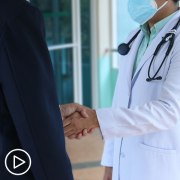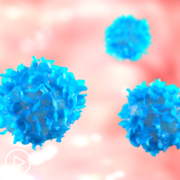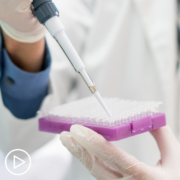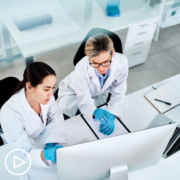Shared Decision-Making, Advice for Partnering With Your AML Team
Shared Decision-Making, Advice for Partnering With Your AML from Patient Empowerment Network on Vimeo.
AML expert Dr. Eunice Wang reviews how shared decision-making impacts overall care by keeping the individual patient and their unique circumstance in mind when determining a treatment path. Dr. Wang discusses the importance of reviewing clinical factors as well as having honest conversations, giving the patient a voice in their care.
Dr. Eunice Wang is the Chief of the Leukemia Service and Professor of Oncology at the Roswell Park Comprehensive Cancer Center in Buffalo, New York. Learn more about Dr. Wang, here.
Related Resources:
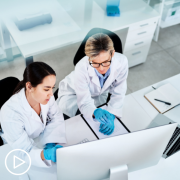
|
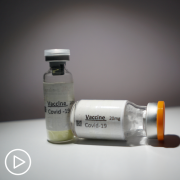
|

|
Transcript:
Katherine:
We’ve been hearing a lot lately about shared decision-making. In your opinion, how is this concept best put into practice?
Dr. Wang:
So, shared decision-making is the process where the physician is no longer dictating the care, and telling patients, “This is the best therapy for you,” and just plowing forward with it. Shared decision-making is really what we want in all of our relationships in our lives, which is sitting down and incorporating many points of view, including both the patient’s wishes and desires as well as those that he or she feels is important to his or her care.
It involves time. It does – it may involve multiple clinic visits. It involves sitting back and having the physician say, “This is the information, this is the data. What is important to you? What is going to work with your particular home situation and family situation and dynamic?”, and then, together, coming up with a decision about care that is individualized for the patient. We talked about individualizing the targeted therapy for the biology of the disease.
Shared decision-making is individualizing the treatment decision for the individual patient and their particular circumstance, and that is best done by sitting down with the patient, looking them in the face, not by looking at your phone, or staring at that computer screen, or reading off some diagnosis from a piece of paper. It’s really involving having those honest conversations.
That’s how things used to always be in medicine, is that it always used to be a decision where the doctor and you would talk and come to a decision, potentially. We’ve kind of gotten away from that with all the electronics and technology, and I think the shared decision-making is a conscious effort by individuals and groups to bring that back in case. It’s very important for AML. AML is a disease that affects largely older individuals, so if you’re in your 60s and 70s and 80s, I can tell you right now that each one of those individuals who have lived decades of life have a certain way that they want to live whatever time they have left.
Katherine:
Of course. Well, when considering a treatment plan, what key questions should patients be asking?
Dr. Wang:
They should be asking – it should be – they should be asking, “How is this going to affect my daily life?” They should be asking questions – “Do I have to be in the hospital? How – do I need to come to the clinic? If I have to come to the clinic, how many times do I have to come to the clinic?”
In my part of the world, it – sometimes even the season in which they’re being diagnosed can impact what disease treatment they want because certain times of the year, travel back and forth in different weather conditions can be difficult. They need to be asking not the question of – that we get asked a lot like, “What would you do if this was your father or your mother?”, but I wouldn’t know.
I turn that around and I say, “But, you’re not my father and you’re not my mother, and if you were my father or my mother, I would ask my father or my mother, ‘What is going to work for you? What are your goals? Do you want aggressive therapy? Do you want to go for high risk/high benefit, or do you want something that’s just going to make you be able to be outpatient for longer, and really what is the most important thing for you and your family right now when we look ahead as to the treatment path?’”
Katherine:
Why is it important for patients to feel like they have a voice in their treatment decisions?
Dr. Wang:
It’s important for them to have a voice in their treatment decision because it is their – first of all, it’s their life, it’s their body. They are the ones that are going to be getting the therapy, suffering the consequences, and making the decisions that can impact not only them, but their loved ones, so – and, I find that the more they understand the disease process, the more they understand and can communicate to me their wishes, the more satisfied we are in care. I’ve had individuals tell me early on in the process where maybe, in a different patient, I would have suggested a second or third treatment – I’ve had them say to me, “I’m done. I’m not – thank you very much.” And, we all have to respect that.
It makes people more satisfied with their care. It makes people feel like they are making – they are guiding the path. They’re not just doing what their husband wants or what their doctor wants. I never want to have a patient say, “Well, I went and got chemo, Dr. Wang, because you wanted me to get chemo.” I don’t want you to get chemo, and I feel like if you have that understanding, I think patients are much more likely to pursue therapy and for the therapy, I think, to be successful or not. But, regardless of whether it’s successful medically, it needs to be successful emotionally for that patient and for that family.

